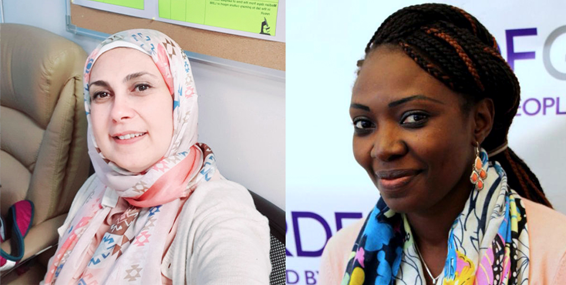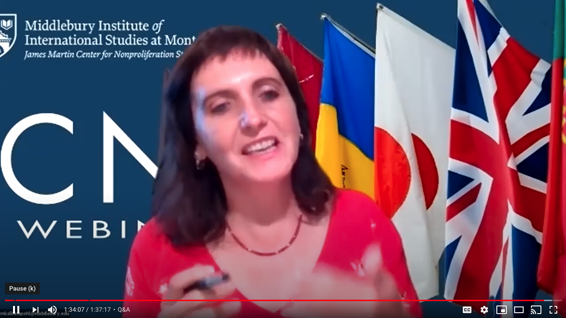This article is part of World War “V”: The COVID-19 Pandemic, a collection of all CNS COVID-19-related articles.
July 23, 2020
Jill Luster, Margarita Kalinina-Pohl, Dr. Rich Pilch
The ongoing novel coronavirus 2019 (COVID-19) pandemic has been the leading topic of discussion for months, including on the CNS website World War “V”: The COVID-19 Pandemic; however, the focus of the discussion is frequently on the response in the United States, China, or other countries severely affected by the pandemic. Since, as Dr. Rich Pilch once noted, no country is safe from the virus until all countries are safe, it is vital to learn about the experiences and expertise of those battling COVID-19 even in underreported areas.
Toward this end, CNS hosted a webinar featuring two former CNS Visiting Fellows discussing the effects of and response to the COVID-19 pandemic in their respective countries: Egypt and Mali. The speakers addressed a wide range of issues and challenges arising from the ongoing COVID-19 pandemic in Egypt and Mali, including biosafety, the One Health Initiative, and lessons for future response efforts.
The webinar featured two professionals: Dr. Mona El-Shokry is an associate professor of medical microbiology and immunology, Faculty of Medicine at Ain Shams University in Cairo, Egypt; and Ms. Kadiatao Dao is a research assistant and biological safety and security head of service and the National Institute of Public Health (INSP), Mali, and currently serves as the security and safety assistant on Mali’s National Covid-19 Crisis Committee. Both were CNS Visiting Fellows and Robin Copeland Memorial Fellows in the fall of 2015.
Margarita Kalinina-Pohl hosted the webinar and Jill Luster served as the webinar’s moderator.
In his special remarks, Dr. Rich Pilch emphasized the importance of investing in international and global relationships, such as through joint training exercises, research collaboration, and information sharing across borders. The Visiting Fellows Program, he said, is a stellar example of the level of cross-border collaboration and trust that has proved beneficial during COVID-19, both for the United States as well as for Egypt and Mali.
Featured Webinar Speakers

Dr. Mona El-Shokry (left) and Ms. Kadiatou Dao (right)
Dr. Mona El-Shokry
Dr. Mona El-Shokry provided an excellent overview of the healthcare system in Egypt. She walked participants through the healthcare, financial, and societal consequences of the ongoing COVID-19 pandemic in Egypt. Dr. El-Shokry explained Egypt’s approach to controlling the pandemic, as well as her efforts as an educator and clinical microbiologist to combat misinformation online and provide Egyptians with up-to-date and accurate information on the pandemic. Important lessons from Dr. El-Shokry included the need for countries and communities to map and understand existing capacities and the need for more training for healthcare providers.
Ms. Kadiatou Dao
Ms. Kadiatou Dao presented an insightful account on public healthcare challenges in Mali and the country’s response to the pandemic. Ms. Dao detailed her experience carrying out risk assessments using the One Health approach in 52 laboratories to determine the labs’ understanding and training in the proper use of personal protective equipment and their ability to adhere to social distancing and other prevention precautions. As a public health expert Ms. Dao recommended strengthening surveillance at Mali’s ports of entry, respecting recommended prevention procedures, and using an incident management system to coordinate responses.
Key Takeaways on COVID 19 Perspectives
All the speakers, including Dr. Rich Pilch, highlighted the importance of resource mapping (human, material, and financial) for the current COVID-19 pandemic and future response efforts. The speakers all expressed concern with the politization of the pandemic and the rampant use of disinformation and misinformation to confuse and scare the public. The CNS webinar highlighted the need for more and better communication to raise public awareness and trust.
From the Webinar Organizers
This CNS webinar was an excellent showcase of the vitally important, life-saving work of two of our former Visiting Fellows, whose training in WMD nonproliferation had bolstered their readiness for the challenges of 2020. “The presentations were extremely enlightening, and the discussion illustrated how global in nature pandemics are,” said Dr. Pilch, “not just in the spread of the virus, but also in its effects and responses.”
CNS organizers were grateful for the presenters’ time and effort in developing and delivering their presentations and willingness to share their lessons and insights during this critical pandemic.

Margarita Kalinina-Pohl

